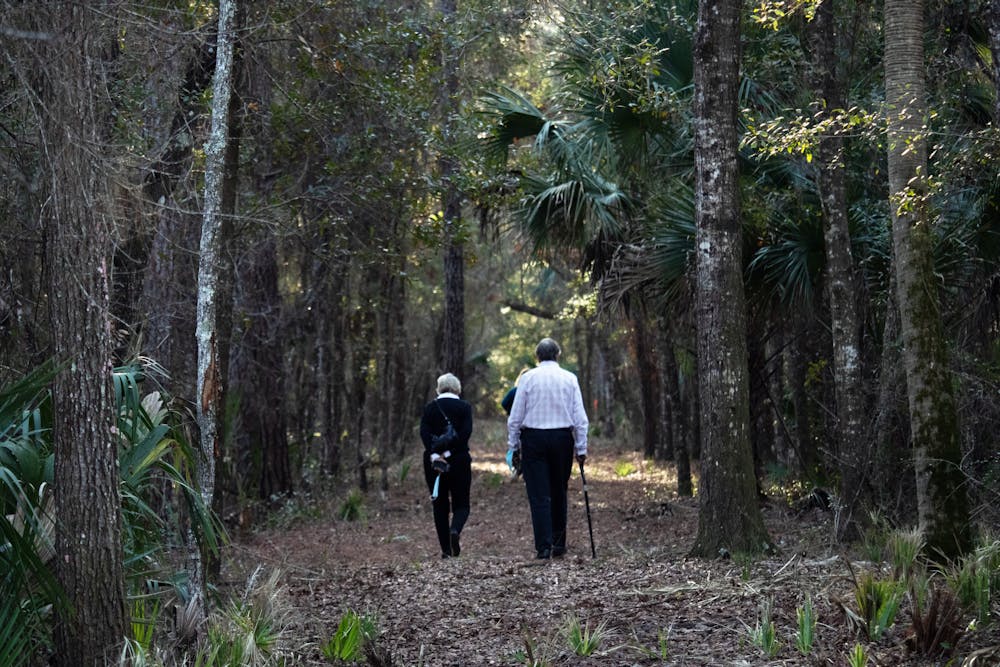While driving along Florida State Road 24, Marvin Dunn noticed a humble sign that read “Rosewood,” and he decided to turn left.
As an author and historian of Florida’s Black history, Dunn knew of the atrocities committed in the north Florida town so long ago. He hiked on foot, deep in the palmettos and pines, along the railroad track he knew once served as a vital escape route.
Then, he discovered the graveyard.
“I had a very strange feeling,” Dunn said. “Like spirits were reaching out to me.”
Among the tombstones was the name “Goins,” which he recognized as one of the original families at the time of the Rosewood massacre.
Dunn later purchased a piece of property in Rosewood, where a wreath laying ceremony took place Jan. 8 for the massacre’s centennial. Though not a descendant himself, Dunn bought it because many of the original Black families had left, and Rosewood is today a white community.
“African Americans need to own the blood land,” Dunn said. “We need to own some of the places where these terrible things happened so we can retell these stories — not to make anybody feel bad, but to preserve the history for its own sake.”
During his experience in the graveyard, he sensed the history beneath his feet.
One hundred years ago, Rosewood, Florida, was a thriving Black community just under 50 miles west of Gainesville that provided residents decent jobs and land ownership opportunities — an anomaly nestled in the Jim Crow South. That was until Jan. 1, 1923, when a white mob invaded, murdered inhabitants and set the town ablaze.
Survivors sought refuge in the swamp as they watched their lives be destroyed in a spontaneous act of hate. Law enforcement wouldn’t come to the rescue.
The mob’s rage was spurred after a white woman in neighboring Sumner claimed that an unidentified Black man had attacked her. The search for the alleged attacker began in Rosewood, and when one family, the Carriers, defended themselves, whites from neighboring counties and members of the Ku Klux Klan from Gainesville descended upon the town.
John Wright, the white owner of the Rosewood general store, helped arrange the evacuation of women and children by train, but there was no saving the town or its dreams of opportunity. After seven days of terror, official reports say eight people died from the violence — six Black, two white — though other estimates claim dozens more.
It wouldn’t be until 70 years later that anyone tried to right the wrongs of the past.
In 1994, the state of Florida granted reparations of $150,000 to each survivor and scholarships to their descendants. But this is likely a one-time deal, as it is the only time Black people have received formal compensation for past racial violence.
Discussions of reparations persist, though white Americans generally don’t look on them favorably, said Maxine Jones, a history professor at Florida State University and former researcher for the reparations bill.
Only 28% of white Americans approve of reparations for Black people with enslaved ancestors, but 86% of Black Americans do, according to a University of Massachusetts Amherst/WCVB poll.
“There’s a debate over what reparations should look like,” Jones said. “Reparations don’t have to be money, but opportunities. For me, the real win is that they got a chance to tell their story.”
Though the survivors are gone, the scholarship continues to aid their families, like descendant Raghan Pickett, 20. With her tuition covered, Pickett is studying political science at Florida A&M University. While at FAMU, she met someone who also received the scholarship.
“It was such a crazy coincidence,” Pickett said. “We still talk to this day.”
Despite the reparations, the pain is still raw within the descendants’ families a century later. For descendant Gregory Doctor, Rosewood haunted his childhood home, but it was never discussed. It wasn’t until the remaining survivors broke their silence in 1982 that he discovered the harrowing truth about his family’s history.
“Growing up, I knew something wasn’t right,” Doctor said. “When the adults would talk, I saw sadness and tears. But I was always told ‘It’s not a conversation for children.’”
Whenever Doctor asked his grandmother about their extended family, he noticed her deep sorrow, but he didn’t understand its source. After learning the truth, it made sense why the women had been so protective over the boys in the family, Doctor said.
When he discovered descendants of the mob in his own neighborhood, the grief was overwhelming.
“Can you imagine my mom knowing these people lived nearby?” Doctor said, “I played with their kids.”
Many survivors remained silent for decades after the massacre in fear of the original perpetrators tracking them down. Others couldn’t bear to relive the trauma they’d endured.
Doctor’s eyes still well with tears to think of how his grandmother suffered, he said.
To keep the story alive, Doctor and other descendants established Remembering Rosewood, an organization that will host a series of events Jan. 8-14 for the massacre’s centennial. Among the ceremonies are discussion panels and film showings at UF, a traveling museum, an awards gala and the wreath laying ceremony on Dunn’s property.
Though there’s been progress since 1923, descendants worry that many still avoid the tough conversations around Rosewood and resist learning its history. Jonathan Barry-Blocker, a descendant and UF professor, stressed that Black Americans must have the power to tell their history because so much is often left out.
“The South is notorious for hiding these stories,” he said. “And I’m not going to let someone’s existence be erased because it makes people uncomfortable.”
But Barry-Blocker has faith the next generation will preserve these stories. It’s the ability of young people to protest, ask questions and push back that gives Barry-Blocker hope for change.
“It’s as though they’re collectively saying ‘That ain’t right,’” Barry-Blocker said. “This is a whole generation that isn’t going to take it anymore.”
Contact Jack Lemnus at jlemnus@alligator.org. Follow him on Twitter @JackLemnus
Jack Lemnus is a fourth-year journalism major and rural Alachua reporter. He loves to practice his Spanish, fill his bookshelves and gatekeep what he considers underground music.






